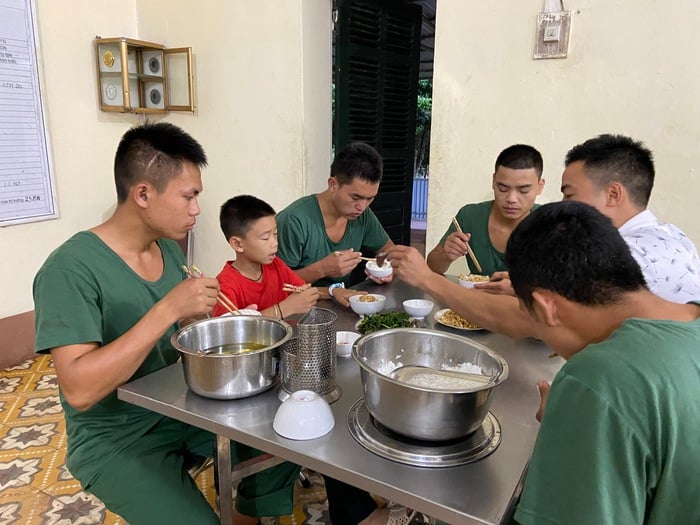Based on that reality, the Border Guard force has coordinated with theeducation sector of border localities to open thousands of literacy classes to help poor women have the opportunity to develop themselves and improve their quality of life.
The image that impressed me the most during my visit to the literacy class in Pu Hao village, Muong Lan commune, Sop Cop district, Son La province organized by Muong Lan Border Guard Station was a young woman carrying her baby to school. All the students in the class were Mong women. Some of the women had their children with them, but the most special was Giang Thi Song with her 9-month-old son. Song diligently wrote and then spelled each letter in unison with the whole class while her son slept soundly on his back. The Border Guard officer in charge of the class shared that Song often carried her baby to school.
Ms. Song is only 20 years old but already has 2 children, a 2-year-old and a 9-month-old. Her husband always encourages her to go to school but cannot look after both of them, so every night she has to carry her baby to school. "The baby is very well-behaved, rarely cries, sometimes sleeps the whole day on my back so I can still study" - Ms. Song shared.
Like many other women in Muong Lan commune, due to her large family, lack of food and clothing, Ms. Song could not go to school. More than 20 springs have passed, but the dream of knowing how to read and write has always urged her. The opportunity opened up when Muong Lan Border Guard Station - Son La Border Guard opened a literacy class, and she decided to apply to join even though her child was still very young.
Ms. Song confided: "Being illiterate is very difficult. I want to go to school to learn how to read and write, to broaden my knowledge. When I can read, I will be able to read the instructions for giving medicine to my child when he is sick, and know how to check the expiration dates of foods and household items."
Another image that impressed me was a woman about 30 years old with large patches on her forehead and temples. That was Giang Thi De in Pha Thong village, Muong Va commune, Sop Cop district. It was 7 pm but De came very early to copy the lessons.
I asked her and found out that she had been busy at home for the past few days so she couldn't go to class. Today, although she was very tired, she still tried to go to school because she didn't want to miss any more classes.
Ms. De shared: "In the past, my family's life was difficult. Back then, there were no roads, no electricity, no schools, so I and everyone else did not have the conditions to study properly. Not knowing how to read is like being blind. When I went to the hospital, the doctor asked me to sign my name, but I didn't know how to write it, so I was very embarrassed. The doctor guided me to this room or that room, and I didn't know how to read the nameplate, so I kept going the wrong way. That's why when the army announced a literacy class, I immediately signed up."
According to Ms. De, what makes her like going to class is that the Border Guard teachers teach very dedicatedly and in an easy-to-understand way. "The Border Guard teachers teach very easily. Before, I didn't know how to distinguish the letters "n" from the letters "m", the teacher said that the letter "n" has two legs and the letter "m" has three legs, from then on, I never confused the two letters again. Thanks to the Border Guard teachers, I learned letters faster and was able to talk to more people", Ms. De confided.
The images of Ms. De and Ms. Song show that the desire to go to school to learn to read and write is always present in illiterate Mong women. They have put aside their inferiority complex to find a way to bring light to themselves. Understanding that legitimate desire, the Border Guard has been and is continuing to coordinate with local authorities and the education sector to open literacy classes along the country's border.

Currently, Border Guard units are nurturing and sponsoring thousands of students in difficult circumstances so that they can have adequate conditions for education. Photo: Bich Nguyen
On the Ha Giang border, in late April, the border communes of Na Khe, Bach Dich, Thang Mo, and Phu Lung of Yen Minh district simultaneously opened literacy classes for the people. The subjects participating in the classes are mainly the elderly and illiterate women from 15 to 60 years old.
The organization of classes is carried out very systematically by the Border Guard stations in coordination with the education sector. First, the number of illiterate people is checked and counted. Based on the actual survey, the Border Guard, together with the commune police and local authorities, went to each village to mobilize, and at the same time surveyed the location and facilities to open the class. The criteria is that the location of the class must be convenient for the people, ensuring light and essential facilities. To suit the living and working habits of the people, the classes are held in the evening. The Border Guard soldiers are responsible for urging and helping students to attend classes.
Implementing the policy of eliminating illiteracy and universalizing education, Yen Minh district has screened 507 level 1 illiterate subjects. Up to now, 16 classes have been opened with 372 students participating.
Not only Yen Minh, other districts of Ha Giang province have also opened literacy classes according to the plan to implement literacy work in border areas in 2025. Statistics show that, as of May 19, 2025, the whole Ha Giang province has opened and organized 65 literacy classes with nearly 1,500 students participating.
Meanwhile, at the Nghe An border, at this time, every night, the classes of the "Green Military Uniform Teachers" are still lit up. The latest class opened on May 9, 2025 at Tri Le Border Guard Station with the goal of eliminating illiteracy for 11 Mong women in Pieng Vai village, My Ly commune, Ky Son district. According to the program, the 1-year course is taught directly by officers of My Ly Border Guard Station and the school. The curriculum includes 2 subjects: Math and Vietnamese. The class is opened to help people, especially Mong women in Pieng Vai village, to read, write, and calculate, contributing to improving knowledge, promoting economic development, and reducing poverty in the border area.
Major Nguyen Xuan Hoa, Deputy Political Commissar of My Ly Border Guard Station, said: According to the plan to organize the class, in order to not affect the production and daily life of the people, the class is organized in the evenings from Monday to Friday every week.
Joining hands with the education sector to implement the universal education program, from 2019 to 2024, Border Guard units have eliminated illiteracy for 2,737 students and universalized education for 3,308 students, most of whom are ethnic minority women. At the same time, they have mobilized 16,688 drop-out students to return to school...
In parallel with teaching, the green-uniformed soldiers also propagate the Party's guidelines and the State's policies and laws; guide students in applying science and technology in animal husbandry and cultivation to develop the economy, and actively join the Border Guard in firmly protecting territorial sovereignty and national border security.
Along with the work of eliminating illiteracy, the Border Guard also implemented the program "Helping children go to school, foster children of Border Guard Station" to sponsor poor students, orphans, and students in difficult circumstances to have the opportunity to continue studying.
Currently, Border Guard units are sponsoring and supporting 2,844 poor students in border areas (including 87 Laotian students and 99 Cambodian students) with a support level of VND500,000/child/month; taking care of 354 students at Border Guard stations. In addition, implementing the project "Army officers and soldiers help children go to school", the units have adopted 400 children and supported 5,437 students.
Source: https://phunuvietnam.vn/phu-nu-dan-toc-mong-dieu-con-moi-9-thang-tuoi-toi-lop-hoc-xoa-mu-chu-20250525101051512.htm




















































![[Maritime News] More than 80% of global container shipping capacity is in the hands of MSC and major shipping alliances](https://vphoto.vietnam.vn/thumb/402x226/vietnam/resource/IMAGE/2025/7/16/6b4d586c984b4cbf8c5680352b9eaeb0)












































Comment (0)